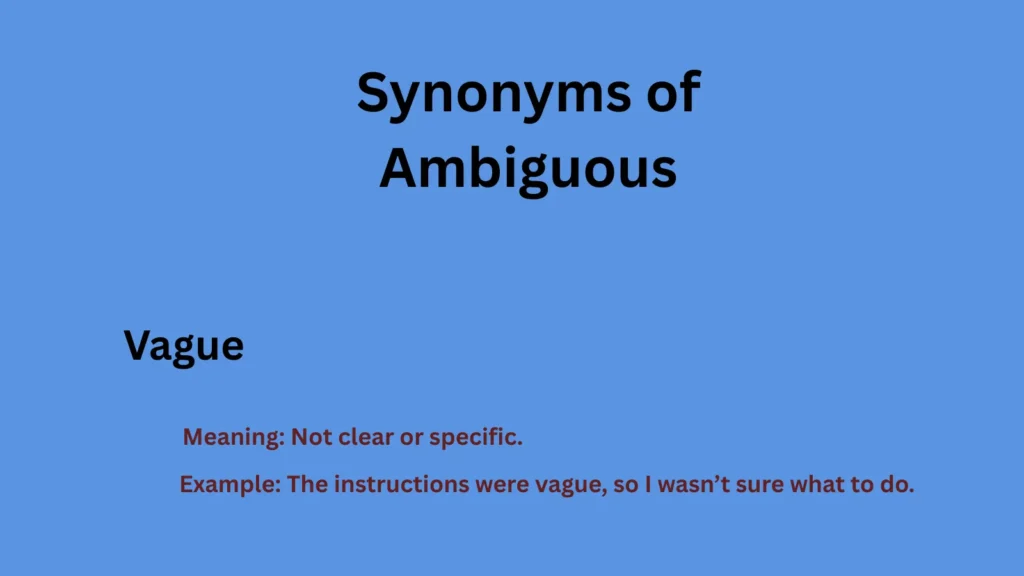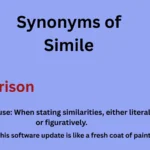Synonyms of Ambiguous offer alternative ways to describe something unclear, open to interpretation, or lacking definite meaning. Whether you’re writing about vague statements, uncertain situations, or double meanings, words like unclear, vague, or indefinite can add precision and variety to your language. This guide explores powerful synonyms of ambiguous with definitions and examples to help you express uncertainty or complexity more effectively.
Using these alternatives can sharpen your tone and make your writing more nuanced. They’re especially useful in academic, analytical, or literary contexts where clarity and subtlety are key.
What Does Ambiguous Mean?
At its core, ambiguous means something that has multiple possible meanings or interpretations. When a statement, situation, or expression is ambiguous, it’s not straightforward; it can be understood in different ways depending on the context.
For example, the phrase “I saw her duck” is ambiguous—it could mean either that you saw her pet duck or that you saw her quickly lower her head.
Ambiguity can be intentional, used by writers, speakers, or artists to provoke thought, humor, or suspense. It can also be unintentional, leading to misunderstanding or confusion.
Key nuances of ambiguous:
- Unclear or vague: The meaning is not fixed or explicit.
- Open to interpretation: More than one understanding is possible.
- Sometimes mysterious or evasive: Can hint at something without fully revealing it.
Ambiguous doesn’t mean shy, modest, or reserved—those traits relate to a person’s demeanor, while ambiguous describes clarity or meaning. So, when we explore synonyms, we focus on words that capture the “unclear” or “open to interpretation” side of ambiguity.
30 Synonyms of Ambiguous — Explained and Exampled
Here’s a friendly guide to 30 great alternatives for ambiguous. Each comes with a short explanation, a practical sentence, and advice on when it fits best.
1. Vague
Meaning: Not clear or specific.
Example: The instructions were vague, so I wasn’t sure what to do.
When to use: Use when the information lacks detail or precision.
2. Equivocal
Meaning: Open to more than one interpretation; deliberately misleading.
Example: His equivocal answer made us suspicious.
When to use: For situations where ambiguity is intentional or suspicious.
3. Unclear
Meaning: Not easy to understand or define.
Example: The message was unclear due to poor wording.
When to use: General term for anything hard to understand.
4. Obscure
Meaning: Not well known or hidden in meaning.
Example: The poet’s meaning was obscure to most readers.
When to use: When ambiguity involves something hidden or difficult to perceive.
5. Cryptic
Meaning: Mysterious or puzzling in meaning.
Example: She left a cryptic note on the table.
When to use: When ambiguity feels like a riddle or secret.
6. Ambivalent
Meaning: Having mixed feelings or contradictory ideas.
Example: He felt ambivalent about moving to a new city.
When to use: When ambiguity involves emotions or attitudes.
7. Indefinite
Meaning: Not exact or fixed.
Example: The deadline was indefinite, which made planning difficult.
When to use: For uncertainty about time, amount, or limits.
8. Indeterminate
Meaning: Not precisely fixed or established.
Example: The results were indeterminate and inconclusive.
When to use: Formal or scientific contexts involving unclear data.
9. Nebulous
Meaning: Hazy, vague, or ill-defined.
Example: His ideas were nebulous and hard to follow.
When to use: When something is unclear and lacks form.
10. Doubtful
Meaning: Uncertain or questionable.
Example: The plan seemed doubtful of succeeding.
When to use: When ambiguity raises skepticism.
11. Enigmatic
Meaning: Mysterious and difficult to interpret.
Example: The smile was enigmatic, hiding her true feelings.
When to use: When ambiguity is intriguingly puzzling.
12. Double-edged
Meaning: Having two possible and often opposing meanings or effects.
Example: His comment was double-edged, both a compliment and a warning.
When to use: When ambiguity cuts both ways.
13. Equivocating
Meaning: Using ambiguous language to avoid commitment.
Example: She was equivocating during the interview to hide her real opinion.
When to use: When someone purposely avoids clarity.
14. Delphic
Meaning: Obscure, ambiguous, or puzzling.
Example: The leader’s delphic statement left everyone confused.
When to use: Literary or formal use for cryptic ambiguity.
15. Paradoxical
Meaning: Seemingly contradictory but possibly true.
Example: It’s paradoxical that less work can sometimes mean more productivity.
When to use: When ambiguity arises from contradictions.
16. Opaque
Meaning: Not transparent or clear.
Example: The document was deliberately opaque to confuse readers.
When to use: When something is deliberately hard to understand.
17. Noncommittal
Meaning: Not expressing a definite opinion.
Example: He gave a noncommittal response to avoid controversy.
When to use: When ambiguity involves avoiding a clear stance.
18. Uncertain
Meaning: Not known or definite.
Example: The future of the project remains uncertain.
When to use: For general ambiguity about outcomes.
19. Indistinct
Meaning: Not clear or sharply defined.
Example: The outline of the mountain was indistinct in the fog.
When to use: When visual or sensory ambiguity occurs.
20. Muddled
Meaning: Confused or jumbled.
Example: His explanation was muddled and hard to follow.
When to use: When ambiguity causes confusion.
21. Confusing
Meaning: Causing bewilderment or lack of clarity.
Example: The plot was confusing due to ambiguous motives.
When to use: Everyday speech to describe unclear situations.
22. Unresolved
Meaning: Not settled or explained.
Example: The ambiguous ending left the mystery unresolved.
When to use: When ambiguity leaves questions open.
23. Circumlocutory
Meaning: Using many words where fewer would do; indirect.
Example: His circumlocutory speech avoided the main point.
When to use: When ambiguity arises from overly wordy explanations.
24. Polysemous
Meaning: Having multiple meanings (especially in linguistics).
Example: The word “bank” is polysemous, meaning both a financial institution and riverbank.
When to use: Technical or linguistic contexts.
25. Multifaceted
Meaning: Having many aspects or sides.
Example: The issue is multifaceted and complex.
When to use: When ambiguity comes from complexity.
26. Inexplicit
Meaning: Not fully or clearly expressed.
Example: His instructions were inexplicit, causing confusion.
When to use: When something lacks clear detail or definition.
27. Questionable
Meaning: Doubtful or uncertain in nature.
Example: The source of information was questionable.
When to use: When ambiguity affects trustworthiness.
28. Ambiguous-looking
Meaning: Appearing unclear or having an uncertain appearance.
Example: The ambiguous-looking symbol puzzled everyone.
When to use: To describe visual or superficial ambiguity.
29. Blurry
Meaning: Not seen or defined.
Example: The photograph was blurry and ambiguous.
When to use: Visual ambiguity or metaphorical lack of clarity.
30. Foggy
Meaning: Hazy or unclear mentally or visually.
Example: His memories were foggy and ambiguous.
When to use: When ambiguity involves unclear perception or memory.
How to Choose the Right Synonym
Choosing the best synonym for ambiguous depends on subtle distinctions:
- Is the ambiguity intentional?
Use equivocal, cryptic, or delphic. - Is it emotional or attitudinal ambiguity?
Go for ambivalent. - Is it about vagueness or lack of detail?
Try vague, indefinite, or inexplicit. - Is the ambiguity confusing?
Pick muddled, confusing, or unclear. - Is it more visual or sensory?
Use blurry, foggy, or indistinct. - Is it formal or scientific?
Use indeterminate or polysemous. - Is it about mixed or contradictory meanings?
Paradoxical or double-edged are good choices.
Cultural and Emotional Contexts
Some synonyms carry emotional or cultural weight:
- Equivocal and noncommittal can sound a bit evasive or untrustworthy in some cultures.
- Cryptic and enigmatic often suggest positive mystery or intelligence.
- Ambivalent is commonly used in psychological contexts to describe complex feelings.
- Opaque can imply deliberate secrecy or even dishonesty.
So, be mindful of your audience and context when choosing your words.
Conclusion:
In conclusion, using synonyms of ambiguous allows you to convey uncertainty, vagueness, or multiple meanings with greater clarity and depth. Words like unclear, vague, equivocal, and indefinite help you avoid repetition while adding nuance to your expression.
These alternatives are especially valuable in analytical, literary, or critical writing where precision matters.
By mastering the use of synonyms of ambiguous words, you can make your language more versatile, expressive, and impactful.

I am Awa White, a passionate writer who loves crafting stories that touch hearts. I explore emotions and everyday life through my words. I strive to inspire and connect with readers through every piece I write.


